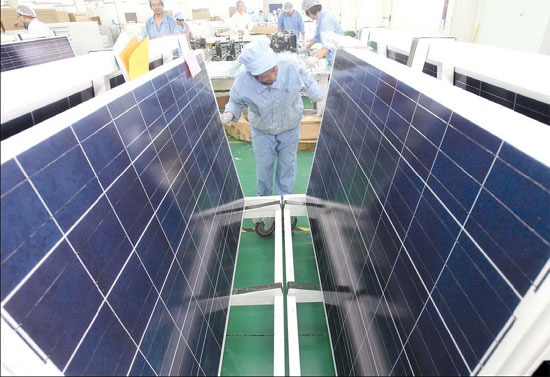Solar industry face export challenges
16 January 2013
The solar trade disputes between China and Europe triggered increasing attention globally in 2012 and will continue to bring deep changes to the industry.
“The trade conflicts in the photovoltaic solar industry between China and Europe should end as soon as possible because it is bad for everyone,” said Reinhold Buttgereit, secretary-general of the European Photovoltaic Industry Association.
 |
|
Workers checking the quality of solar panels at a PV solar factory in Jiangsu province. For the Chinese solar industry, the path to its largest overseas market – Europe – is increasingly narrowing because the European Union has started anti-dumping and anti-subsidy investigations on made-in-China solar products. Provided to China Daily |
He made the comment to China Daily during the 2012 Intersolar China Conference in December, one month after Europe initiated an anti-subsidy investigation on solar panels imported from China, in addition to the anti-dumping probe it launched in early September.
He said the association had suggested the European Union should accelerate the investigations into China’s PV solar products.
“I hope this conflict won’t take too long to come to an end because we will have to cooperate again eventually, no matter who wins,” said Buttgereit.
Because Europe is China’s largest overseas market for PV solar panels, accounting for more than 70 percent of the country’s exports, the anti-dumping and anti-subsidy investigations started by the EU could hurt the Chinese solar industry more severely than a US probe launched in October.
About one year after the United States’ arm of the Germany-based company SolarWorld AG complained that Chinese producers were dumping solar products at below the cost of production in the US and receiving “illegal” government subsidies, the US decided in November to impose punitive tariffs on Chinese PV solar products, with the highest one at about 250 percent, over the next five years.
Around 20 percent of China’s PV solar panels were exported to the US market before the ruling was announced.
The tariffs will raise costs for Chinese solar panel manufacturers, leading to a decline in orders from the US.
Chinese companies hoped to rely on other overseas markets when they had to relinquish business in the US so the EU’s probe came as bad news and has aroused serious concerns within China’s solar industry.
“This is the third time that I have been in China,” said Buttgereit. “I can feel that people from Chinese companies and my Chinese colleagues are more nervous than the last two times when I visited China under the current intense situation.”
China launched an investigation on Nov 1 into polysilicon imports from the EU and on Nov 5 China lodged a complaint with the World Trade Organization regarding local content requirements in some EU countries.

Recent Comments